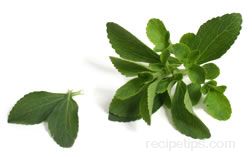Although Stevia is approved as a sweetener in Brazil, Paraguay, and Japan, it has not been approved by the Food and Drug Administration to be marketed as a sweetener in the United States. It is however, sold in some health food stores in the United States as a dietary supplement (which do not require the same standards that are placed upon the food supply), but it must be labeled as a supplement and cannot be labeled as a sweetener or as being sweet. The reason why Stevia has not been approved for sale as a food product in the United States is that researchers have discovered a substance in stevioside that causes changes to occur in the genes of some laboratory animals. It is unclear whether the same changes occur in humans research into this herb is ongoing before the sweetener can be approved as a food product in the United States. It is worth noting that there have been no reports of adverse reactions in people where Stevia is commonly used, however consumption of the sweetener in these countries is low to moderate.
Stevia is believed to have medicinal properties that assist with healing cuts by placing the leaf directly on the wound and also it is believed to provide relief for other skin irritations such as acme, dermatitis, eczema, and some related skin problems. It is easy to digest and is believed to increase energy levels. In the U.S. it is used as a dietary supplement but not as a food additive. However in many other countries it is currently being used in foods and as a sweetener in beverages.








